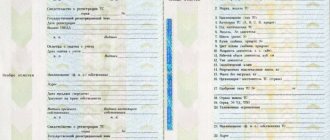Situations in which it may be necessary to re-register an apartment or part of it in the name of a relative, regardless of the circumstances and degree of relationship, occur quite often in Russia. There are also several options for this, but which of them are good depends on the circumstances in each individual case: there are advantages and disadvantages everywhere.
Moreover, if you decide to cheat and fake a sale, you should remember that you will have to pay tax, which is also not suitable, given that the tax amount is calculated based on the value of the real estate. We should not forget that the transfer of proprietary rights may be refused. The most common reasons are the submission of not all required documents, their incorrect execution, falsification of information, contract terms that contradict the law, and detection of an attempt at a fictitious transaction.
Registration of an apartment for relatives
Despite the fact that the most common method of transferring property rights is a real estate purchase and sale transaction, this is not always formalized between relatives for a number of objective reasons.
Moreover, when selling living space to a spouse, child, parent or other person of blood relationship, the law does not provide any advantages. As a rule, this is far from the best way in this case. As you know, property acquired during an official marriage is jointly acquired, which means it will be subject to division during a divorce. Accordingly, the current owner may not be at all interested in this situation, wanting his property to remain with his relative and nothing more.
Dear readers!
Our articles talk about typical ways to resolve legal issues, but each case is unique. If you want to find out how to solve your specific problem, please contact the online consultant form on the right →
It's fast and free!
Or call us by phone (24/7):
If you want to find out how to solve your particular problem, call us by phone. It's fast and free!
+7 Moscow,
Moscow region
+7 Saint Petersburg,
Leningrad region
+7 Regions
(free call for all regions of Russia)
For children
You, as the owner of the apartment, have the right to re-register it in the name of any person in the way you choose yourself. There are no strict criteria such as prohibiting the sale of housing to children or mandatory donation to parents. If we take into account the human factor, everyone still considers different options for different relatives.
For children, either a deed of gift or a will is often drawn up. Thus, the parent has the opportunity to protect their property rights as much as possible. In addition, the donated property cannot be divided during a divorce under any pretext, which means it will remain 100% with the recipient. Of course, if this person does not decide to sell the apartment, but this will already be under his responsibility.
How to transfer ownership of housing to a minor child?
The transfer of property to young children is absolutely identical to any other transaction concluded with an adult. The only difference is that the interests of the child are represented by his parent or guardian, who in any case does not receive ownership rights to the property accepted for the minor.
For spouse
In the case of spouses, there are many more options and it all depends on the relationship in the family. For example, if the relationship is not ideal, it makes sense to enter into a purchase-sale or exchange agreement. If the relationship is good, you need to preserve the property from outside encroachment, then a gift agreement is better. However, you will not be able to claim the apartment after that or even part of it. As an option, you can draw up an agreement regarding the division of property acquired jointly if we are talking about a marital divorce.
For parents
Parents should renew their housing, again, in the form of a gift, in order to secure it for them and save them from having to pay taxes. This is the most optimal option, but not the only correct one, since it all depends on your goals and family relationships.
For grandchildren
If it is necessary to register real estate for a minor child or minor grandchild, only a deed of gift is appropriate. The parent (adoptive parent, guardian) accepts the gift on his behalf. For older, adult grandchildren, a will is more appropriate.
For brother/sister
Donation or purchase and sale are good when re-registering an apartment in the name of a sister or brother, just like a deed of gift, if everyone is happy with this option. Each owner has the legal right to dispose of his property as he needs it, so no one will interfere with the method you choose.
To distant relatives
Considering how best to re-register an apartment, we note that in addition to the option of selling and deed of gift, today there are slightly less popular, but still very relevant methods of alienating housing:
- Notarized pledge agreement;
- Apartment rent.
In the first case, it is noteworthy that in Russia the state lending system is not ideally developed and it is possible to obtain a loan only by documenting the presence of a sufficiently high level of income. The rent option is convenient because you don’t need to pay money for the apartment. Rent can be called a gratuitous transfer of an apartment, but under certain conditions, which makes the gratuitousness conditional.
Nuances of family ties
Family ties and the chosen method of transferring property are not as important as the nuances of taxation. Depending on the distance of relationship, tax obligations change. The closer the relative, the higher the likelihood that he is exempt from taxes and vice versa.
Taxation when donating an apartment to grandchildren
The tax code provides that gifts of real estate to grandchildren are not taxable.
And all because the grandson is a close relative. This is provided for in Article 14 of the Family Code.
The fact is that persons who, in accordance with the family code, are close relatives, carry out transactions with each other and are exempt from the need to pay taxes. Therefore, you do not need to file a tax return, nor do you need to pay 13% to the state.
Apartment renovation options
As practice shows, in any case, it is better to re-register an apartment in the name of a relative only officially, with the conclusion of an appropriate agreement, since we are talking, one way or another, about a transaction. It could be:
- Purchase and sale;
- Gift deed for an apartment;
- Transferable annuity;
- Exchange of property;
- Housing will;
- Inheritance.
At the same time, tax deductions cannot be ignored, which are different in each case and depend on factors such as:
- Relation degree;
- Market value of a residential apartment in a given region;
- Presence or absence of tax benefits.
Donation
Transferring an apartment directly under a gift agreement is in every sense a gratuitous transaction. It excludes the receipt of money from the donee and prohibits setting any conditions for him to obtain housing rights, as can be done in the case of a will. Accordingly, the donor does not receive anything in return and, if the gift is accepted, he is immediately deprived of his property rights during his lifetime. At the same time, it is prohibited to draw up a deed of gift on behalf of a minor, even if parents or guardians act instead. On the one hand, a gift agreement is the best option, because the gift will not be considered jointly acquired property, remaining in the personal property of the recipient even in the event of a divorce. On the other hand, it is possible to challenge the donation in court if any of the interested parties has grounds for this.
Will
The question of how to re-register an apartment in the name of a relative after the death of the owner, according to a will, is perhaps the simplest. When a person wants his property to go to a specific person, and not be legally divided among everyone, he goes to a notary’s office and draws up a will there. In this case, it does not matter at all which relative we are talking about. For example, despite the fact that the owner may have children who are heirs of the first priority, if the parent left a will in the name of his second cousin, the apartment will go to the second cousin and no one else has the right to claim it, with the exception of disabled young children, who a small share is equally assumed.
Rent agreement
As for the rent agreement between relatives, in this case one party, the owner, transfers his apartment to the other, while the other accepts it, pledging to pay the first a fixed amount of money in an agreed manner. The form of payment can be different, for example lifelong or unlimited. Rent is paid to the owner until the end of his life, after which ownership can be re-registered.
Exchange agreement
Unlike deed of gift and annuity, the exchange agreement has more expressive features. The transaction assumes that the parties exchange apartments or exchange an apartment for a private residential building. In a voluntary exchange with relatives, it is not necessary to exchange real estate objects of equal size. However, so that there are no grounds to challenge the deal in court, it is important to record all the nuances and notarize the agreement, indicating that the party receiving the smaller area has no complaints and understands what it is doing.
Agreement on division of property between spouses
As for a voluntary agreement, divorcing spouses can divide property as they wish if they find a compromise. However, even when everything is divided peacefully, it makes sense to have the agreement certified by a notary office, so that later, having changed their mind, one of the parties does not decide to take everything away through the court. All conditions must be written down completely and clearly, excluding possible claims in the future: this gives certain guarantees to both parties.
Re-registration of an apartment after the death of the owner
The current owner of the living space may not care at all about transferring his property to relatives - the transfer of property rights also occurs during inheritance by law. The apartment goes to the first-priority heirs, who contact a notary to apply for inheritance rights within six months from the date of death of the testator. Having entered into rights, having received a certificate of inheritance, Rosreestr makes all the necessary changes regarding the new owner with it and other documents within three days.
Re-registration of a share in an apartment
When the apartment is in shared ownership, where the shares are clearly allocated and each owner has a separate right to his part of the living space, each of them has the opportunity to alienate his part in favor of another person. Without the consent of other owners, only a share of the apartment can be rewritten, and all of it - only with the written and notarized consent of all together. This transaction is formalized at a notary's office. The choice of contract, that is, the method of alienation, is the same as in other cases - be it a sale, a gift or something else.
It is worth noting that in the case of a sale, the risks of challenge are significantly reduced, while in the case of a donation they are quite high. In addition, contestation, as a rule, occurs after the death of the donor, unless the donor himself decided to challenge the deed of gift. In addition, no matter what family ties and relationships, giving real estate, even in shares, is a very expensive pleasure.
Re-registration of the share as such is impossible if the apartment is one-room, since it is not possible to allocate a separate part of it in kind.
Re-registration of rights to a room in a communal apartment
In the same way, you can re-register ownership rights to any of your relatives by transferring to him your room in a communal apartment. However, for this it is important to have rights to it; the share must be allocated. If this is municipal housing, such a transfer is also possible, but necessarily with the consent of the municipality, since the contract is concluded with it.
Judicial practice on re-registration of shares
Court cases involving the transfer of shares to other owners are not uncommon. Often relatives or other owners cannot agree and begin to dispute the right to transfer the share to one of them. For example, in a situation where parents and their daughter have shares in an apartment, and the parents decided to transfer their shares to their grandson. The daughter can claim the right to a share. From a legal point of view, such claims are absurd, since parents have the right to conduct a gift transaction with whomever they see fit. Family ties and consent of other shareholders do not play a role in this case.
In case of any controversial issues, you should seek advice from a lawyer. And only if it was not possible to resolve the conflict pre-trial, you need to file a claim in court.
What are the most profitable and convenient ways to re-register?
When choosing a method of profitable and convenient re-registration, pay attention to the consequences of your actions, as well as whether you want your relative to pay taxes, and whether you want to pay them yourself. In addition, consider the risks not only for yourself, but also for the relative to whom the rights are transferred. If you are afraid that he may be deceived and his home taken away, choose a deed of gift. When you are afraid that you will be deceived, make a sale.
The most profitable option, if you do not plan to make a profit with a relative, is still a gift agreement; otherwise, an equally convenient and profitable option is purchase and sale. With rent, exchange and inheritance, there are much more complexities and time and effort are also much higher.
How to formalize a donation if a grandson or granddaughter is a minor?
Generally, when a grandparent makes a gift of real estate in respect of their grandchild, it is provided that the child is under 18 years of age.
This means that the child cannot fully participate in the gift transaction due to the lack of necessary knowledge and legal capacity.
What to do in such a situation? Wait until you turn 18? In fact, if the need to donate an apartment has arisen now, and the child has not yet reached the age of majority, then the legal representative of the donee can accept the gift.
Typically, the legal representatives are the parents, guardian or guardian. These persons are authorized by the state and legislation to act in the interests of the minor.
These persons must ensure that the contract is drawn up in such a way as to take into account the interests of the minor without prejudice to them. If the transaction somehow attracted the attention of Rosreestr employees, they can invite a representative of the guardianship and trusteeship authority to participate.
Employees of this body check the property for encumbrances and debts, pursuing the interests of the minor. At the same time, the gift agreement is drawn up in this case in relation to the child’s representative, indicating that this person can dispose of the real estate in the interests of the child until the child reaches the age of eighteen.
In what cases do you need to pay taxes?
Spouses, parents, children (including adopted children), grandparents and brothers, sisters are exempt from taxation if they have at least one common parent with the current owner.
For distant relatives, a tax of 13% is provided, calculated from the cadastral value of the apartment. If we are talking about selling, you, as a person who has made a profit, pay this 13% yourself, but only if you have owned the apartment for less than three or five years (depending on when it became yours). In some cases, for example, when donating an apartment or drawing up a will, the agreement is subject to mandatory notarization. In other cases, you can do without this, but at your own peril and risk. When the living space is in shared ownership, you can draw up an agreement, which is also registered by a notary. The transfer of ownership rights itself is always registered in Rosreestr after submitting the appropriate application with the attached documents on the basis of which the rights are transferred.









